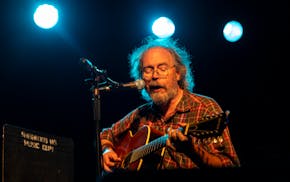When Julie Johnson composes a piece for a dance work, it always starts with long conversations about what the movement is going to look like and what the emotions are. Then she would go create one based on all the notes she took.
The flutist's new piece, "Touch Code: (Re) Claiming Space," is about recovery in the aftermath of assault and other forms of trauma and will be performed by dancers from Jagged Moves at the Southern Theater in Minneapolis. It is choreographed by Jennifer Glaws.
"It was a really cool experience," Johnson said of the project that incorporates dance, sculpture, video and her music. Six dancers perform in a sculptural world, navigating their responses to interruptions of their personal space. The movement highlights a push and pull of power, tension and release as dancers kinesthetically respond to one another and their environment.
Johnson is no stranger to interesting collaborations, having been a part of a number of interdisciplinary projects. Her contemporary sound defies category, weaving genres as diverse as contemporary classical, jazz and blues.
"I've always kind of been the weird flutist in the group or the weird musician in that I don't necessarily fit," she said. "I play classical, I play jazz. I play world music — but I sort of like not necessarily fit in a box with any of those categories."
Johnson hit her stride as a musician when she began discovering looping and effects pedals. "That's when I really feel like I was able to settle into the artist that I was kind of looking to be," she said. Playing with different types of musicians and using different styles helped me to cultivate her own voice style.
Having been awarded numerous grants from the likes of the Minnesota State Arts Board, the American Composers Forum and the Lanesboro Arts Center, she's a sought after music maker and player.
"She's just a brilliant performer," said choreographer Glaws. "When she enters the dance, her sound just makes the atmosphere so palpable."
The two created the choreography and score for "Touch Code" simultaneously.
"I feel like the music and the movement really shared space equally in a way. One didn't really come before the other." Glaws calls Johnson's score "ominous," with "lots of guts and raw drive," including some moments of lightness.
"There are parts that just feel like pillowcases," Glaws said. "They are fluffy and relaxing."
Glaws knew she wanted to incorporate the delicate intimacy of a flute to the challenging piece of dance, which investigates the notion of finding one's voice after a traumatic event. She also knew she wanted to work with Johnson in particular because she was "attracted to the breadth of the different types of sounds that she makes with her flute."
Glaws became familiar with Johnson's style through her work with other dancers, including Tamara Ober.
Ober and Johnson's first collaborative partnership began in 2012, when they worked on a short piece called "Standing on the Hollow," based on a Flannery O'Connor short story, "Good Country People," which they later turned into a longer piece for the Minnesota Fringe Festival.
Working with Ober made Johnson, who does not have a dance background, want to collaborate with dancers more.
"I feel like I connect better artistically with movement artists than I do with other artists, for some reason," she said.
Over the years, Ober and Johnson have worked together numerous times, including a meditative film virtual dance piece, "Between Light," which was released in September. It reflects on life during the pandemic and pairs Ober's subtle choreography with Johnson's haunting sound.
"Her lungs, and her capacity for breathing, create the incredible, diverse sounds that she makes," Ober said. "It comes from the core of her body. It's almost like when somebody laughs. There are people that have these hearty belly laughs. It's a full-body expression. She does that. It's like every ounce of her is working, like a dancer's body works."
Johnson said the physicality of her flute playing isn't necessarily intentional. "Performing is always a whole-body experience," she said. "And that, to me, that translates to trying to create a sound bed as a whole-body experience for the dancers."
Johnson said the project has pushed her into new realms as an artist. In one composition, she responded to a prompt by Glaws to create a puzzle that is put together to create a complicated rhythmic section that evolves in layers.
"It's one of my favorite things I've ever created," Johnson said. "It's really fun to play."
Besides set compositions, Johnson also improvises with the dancers in the work.
"It's this great interplay between who's leading who, and there's nothing necessarily that's said about — I'm going to lead or the dancers are going to lead or I'm going to respond to this," she said.
"Touch Code" was a long time coming. It was to have opened in March 2020 and now 19 months later, there has been a reboot. The order of the pieces has shifted somewhat and there are new choreographic sections. But Johnson's score is essentially the same.
'Touch Code'
Where: Southern Theater, 1420 Washington Av. S., Mpls.
When: 7:30 p.m. Wed-Sat.; 2 p.m. Sat.; 4 p.m. Sun.
Cost: $20, southern theater.org.

Critics' picks: The 11 best things to hear, do and see in the Twin Cities this week

Critics' picks: The 9 best things to do and see in the Twin Cities this week

The 5 best things our food writers ate this week

The 5 best things our food writers ate this week

